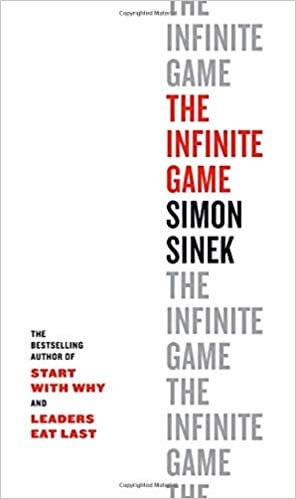You have /5 articles left.
Sign up for a free account or log in.
 The Infinite Game by Simon Sinek
The Infinite Game by Simon Sinek
Published in October 2019
If you want to make an academic upset, one of the fastest and most reliable methods is to apply the logic of business to the operations of academia.
Our hackles will instinctively raise when we hear that we need to “disrupt” ourselves, or that we should be creating minimally viable products to introduce to the “market.” Calling our students “customers” or “end users” is a mistake.
We don’t want to “rightsize” our campuses, or model our educational and research operations on the “lean start-up” concept. Higher ed people might have nothing against “agile development” for the software we use, but we will resist being put in agile teams or being indoctrinated into Six Sigma thinking.
It is because of our allergy to business-speak that I’m happy to report that academics will resonate with The Infinite Game.
The main argument that Sinek makes is that organizations (and here he is mostly talking about businesses) need to understand the game that they are playing. For a business, the goal should be to build long-term sustainability and viability. There is no “winning” business, just as marriage or parenting can’t be won.
Sinek wants business leaders to adopt an infinite mind-set, one which eschews the striving for short-term gains in favor of meeting long-term goals. He contrasts this approach with a finite mind-set, in which driving metrics such as boosting earning or the stock price are what gets prioritized.
The Infinite Game is full of examples of companies that have adopted an infinite mind-set and have then watched their long-term valuation grow as a result. One example in the book is the decision of CVS to stop selling cigarettes, a choice that led to a short-term stock drop but a long-term improvement in the value of the company. The example of CVS is contrasted against the decision of Mylan to raise the price of the EpiPen by over 500 percent.
While I’ve never heard higher ed described as an “infinite game,” the description seems to fit. One of the reasons that Paul Fain’s story “Private Conversations About Private College Closures” feels so consequential is that our entire community feels great pain whenever a college is forced to close.
As a mission-driven ecosystem, we work toward and benefit from the success of our peer institutions. This does not mean that we don’t compete fiercely for students and philanthropic dollars and grants and superstar faculty, but that we understand our peer schools to be worthy competitors.
“Worthy competitors” is the term that Sinek uses to describe how those with an infinite mind-set think about others in the same business. For Sinek, his worthy competitor is Adam Grant -- author of another book that I highly recommend, Originals: How Non-Conformists Move the World.
One of the reasons why higher ed is so tricky for for-profits to do business with, and which is most evident in the rise of the OPM industry, is our infinite academic mind-set.
We truly make our decisions on scales of decades, if not centuries, and are always attempting to balance the near-term needs around financial sustainability with our commitment to align our practices to our mission. OPM companies would be wise to adopt the culture and mind-set of higher ed as an infinite game in their conversations with potential university partners.
As with almost every business book ever written, there are problems with The Infinite Game. Business writers seem to be able to come up with a thesis and then cherry-pick examples to support their case. We seldom see hypothesis testing and control groups utilized in books aimed at a broad business audience.
Applying the thinking of The Infinite Game to our higher ed conversation about the economic viability of tuition-dependent private institutions would make for a fascinating exercise. According to The Infinite Game, financially challenged schools should avoid short-term moves to bolster the balance sheet and instead follow long-term strategies that align with their missions. I’m not sure if at-risk institutions have the luxury of following this strategy.
It would be good to hear about a school that doubled down on aligning its operations to its values and then was able to build a measure of long-term resiliency as a result of these actions.
Higher ed leaders, and those who lead companies that work with higher ed, might want to consider the idea of gifting copies of The Infinite Game to their top leaders and most important partners.
The language of The Infinite Game might help clarify how higher ed thinks of itself and how those who work with higher ed should think about those relationships.
What are you reading?




